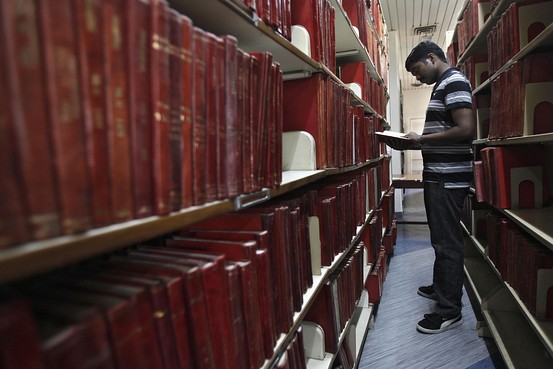 Sir Isaac Newton, the great English physicist and mathematician, once famously said that what he accomplished was thanks to standing on the “shoulders of giants.”
Sir Isaac Newton, the great English physicist and mathematician, once famously said that what he accomplished was thanks to standing on the “shoulders of giants.”
Newton had in mind the scholars and writers who had gone before him, who allowed him to codify the fundamental principles of fields ranging from the mathematics of calculus to the laws of physics. Those giants include Gottfried Leibniz, with whom Newton famously quarreled over who had actually invented the calculus, and Johannes Kepler, whose laws of planetary motion paved the way for Newton’s laws of physics.
Scholars and students today often have to take inspiration from somewhat less lofty sources, amounting to the reading lists that their professors assemble for their courses. The giants for many students today will mostly likely be gigantic textbooks, immense monographs, and arcane journal articles (of which I read many for Economics Journal).
The trouble is that all of these things tend to be rather expensive. Unlike in Newton’s time, when copyright law if it existed was probably ignored as much as it was observed, today large corporate publishing houses hold copyrights over their books and journals that extend worldwide — and they try to enforce them.
Controversy over copyright, in this case large-scale photocopying, has come into focus in India with a lawsuit filed recently in Delhi High Court by Oxford University Press, Cambridge University Press, and Taylor and Francis, all major academic publishers, against Delhi University and Rameshwari Photocopy Services. The photocopy services firm operates within the precincts of the Delhi School of Economics.
A lawyer representing the three publishers confirmed the lawsuit, in which the plaintiffs allege that the photocopying shop has engaged in large-scale photocopying which violates what would constitute fair dealing. They further allege that the university had earmarked sections of books for such copying.
The university registrar’s office declined to comment by phone and did not reply to a follow-up request for comment from India Real Time.
Dharampal Singh, who runs the photocopy shop, confirmed that a case had been filed but declined further comment until after an upcoming hearing.
What’s at issue are “course packs,” essentially bundled packages of readings, drawn from textbooks and journals that are required for students in the masters of arts stream in sociology. To protest the lawsuit, students have threatened to boycott the works of these publishers.
What are the economics here? In the first instance, the rationale for copyright laws, as for patents, is to protect the profits of creators and innovators and thereby create an incentive for future innovation. If every new book or article became freely available the moment it was published, it would lessen the incentive of people to create those works in the first place, much like drug companies would have no incentive to innovate and create new drugs if they could be converted into generics the moment they hit the shelves.
On the other side of the debate, whether applied to overpriced books and journals or overpriced medications, there’s an economic argument that access to knowledge and access to lifesaving drugs both carry an enormous “public-good” value, especially in developing countries. The fact of the matter is that most Indian students wouldn’t be able to afford to buy all of the textbooks and journals at their official prices anymore than an average Indian patient would be able to afford to pay full price for drugs invented in the West. Forget India– many North American students find textbook prices unaffordable and resort to buying used copies from friends or photocopying.
As it happens, India has a thriving generics drug industry which reproduces cheap copies of Western drugs at prices that Indians can afford and many Americans might wish they had access to. The price differential between a branded drug sold in the U.S. and a generic sold in India can be huge, as much in orders of magnitude as buying a textbook at a U.S. university bookshop (where a typical textbook can be several hundred dollars), as compared to the cost of a few dollars involved in photocopying it.
It’s clear individual students have an incentive to purchase a photocopied course pack rather than paying full price for buying all of the books and journals that it contains. But at the level of society as a whole, that’s not necessarily a good economic idea.
Much as with access to drugs, the public-good value of access to knowledge would best be served by making it available to students at reasonable cost while at the same time respecting the copyrights held by publishers.
There could be several different ways of doing this. One obvious way would be to strengthen the resources available to university libraries to stock up on the necessary books and journals. Students at universities in the West typically will have access to libraries which make available their course readings and often also offer free electronic access to journals and other material.
But such access is sorely lacking in the underfunded and overcrowded public universities in India, including Delhi. Well-stocked libraries with the necessary copyright clearance for photocopying would reduce the demand and therefore presumably the supply of privately photocopied course packs.

